Book contents
- Frontmatter
- Dedication
- Contents
- List of figures
- List of tables
- Preface
- Abbreviations of codes of conduct
- PART I A theory of professional ethics
- 1 Fundamental concepts
- 2 Ethical relationships
- PART II A theory of mediators’ ethics
- PART III Dealing with ethical problems
- Appendix I A proposed model code of conduct for mediators
- Appendix II Model standards of conduct for mediators (2005)
- Bibliography
- Index
1 - Fundamental concepts
from PART I - A theory of professional ethics
Published online by Cambridge University Press: 05 March 2016
- Frontmatter
- Dedication
- Contents
- List of figures
- List of tables
- Preface
- Abbreviations of codes of conduct
- PART I A theory of professional ethics
- 1 Fundamental concepts
- 2 Ethical relationships
- PART II A theory of mediators’ ethics
- PART III Dealing with ethical problems
- Appendix I A proposed model code of conduct for mediators
- Appendix II Model standards of conduct for mediators (2005)
- Bibliography
- Index
Summary
Introduction
The meanings of ethics
Ethics is a concept with multiple meanings. Some scholars treat ethics as synonymous with morality. For them, ethics, like morality, means the moral rules that govern individual behavior and determine what is right and wrong and what the moral duties of individuals are. Others believe that morality and ethics differ from each other for various reasons. They understand ethics as the discipline or study of morality. Ethics according to this view is the philosophy of morality that deals with the big questions of human life: what is justice? What is fairness? What is right and wrong? What rights does a person have? A third approach sees ethics as a type of particular morality. Ethics as particular morality refers to specific standards of behavior that apply to members of a particular group because of their belonging to the group. This book refers to ethics as particular morality. It explores the morality that applies to people who exercise a professional role, and focuses on the ethics of mediators.
Role-ethics and professional ethics
If ethics is a type of particular morality that applies to role-holders, it must combine two essential components: morality and role, that is, norms of morality as applied to the performance of a role. Daniel E. Wueste, for example, argued that “a professional ethics is not a mere restatement of the norms of ordinary morality (i.e. norms governing human conduct generally); the norms of a professional ethic are tied to an occupation or role.” I use the term “ethics” for reasons of convenience. It serves to distinguish between the particular morality of role-holders (which could also have been termed “role-morality”) and ordinary or common morality that applies to every person. Professional ethics is a special case of role-morality because all professionals fulfill a role but not all roles are professional. Thus, role-ethics is broader than professional ethics. Figure 1.1 describes the relationship between ordinary morality and professional ethics.
Professional ethics refers to the moral aspects of performing a professional role, that is, to the evaluation of professional conduct as morally appropriate or inappropriate. For example, a professional is morally bound to keep in confidence his or her clients’ personal information when the information has been obtained in the course of practice.
- Type
- Chapter
- Information
- A Theory of Mediators' EthicsFoundations, Rationale, and Application, pp. 3 - 36Publisher: Cambridge University PressPrint publication year: 2016



